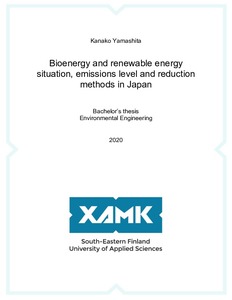Bioenergy and renewable energy situation, emissions level and reduction methods in Japan
Yamashita, Kanako (2020)
Yamashita, Kanako
2020
All rights reserved. This publication is copyrighted. You may download, display and print it for Your own personal use. Commercial use is prohibited.
Julkaisun pysyvä osoite on
https://urn.fi/URN:NBN:fi:amk-2020052012629
https://urn.fi/URN:NBN:fi:amk-2020052012629
Tiivistelmä
Recently climate change is one of the serious issues nowadays. Generating energy is considered to be one of the contributors to it. Therefore, renewable energy could be one solution to tackle the problem. Finland and Japan are similar in terms of its high forest rate. Bioenergy business is advanced in Finland, however, bioenergy business in Japan has not been spread yet unlike Finland. But still, there are woody biomass power stations in operation.
The thesis was dedicated to find out what woody bioenergy and renewable energy situation, how woody bioenergy is produced, emissions level and reduction methods are available in Japan. To do the research, literature review and interviews were conducted, and case studies were analyzed.
In this study, the woody bioenergy situation in Japan revealed how woody bioenergy business could be a part of local business to revitalize local society and Japanese forestry. However, there are still conflicts between citizens and local administrations. They should be satisfied with the decisions. In this way, the sustainable business could be built. In the future, it would be recommended to raise awareness of the importance of woody bioenergy and spread throughout Japan.
The thesis was dedicated to find out what woody bioenergy and renewable energy situation, how woody bioenergy is produced, emissions level and reduction methods are available in Japan. To do the research, literature review and interviews were conducted, and case studies were analyzed.
In this study, the woody bioenergy situation in Japan revealed how woody bioenergy business could be a part of local business to revitalize local society and Japanese forestry. However, there are still conflicts between citizens and local administrations. They should be satisfied with the decisions. In this way, the sustainable business could be built. In the future, it would be recommended to raise awareness of the importance of woody bioenergy and spread throughout Japan.
